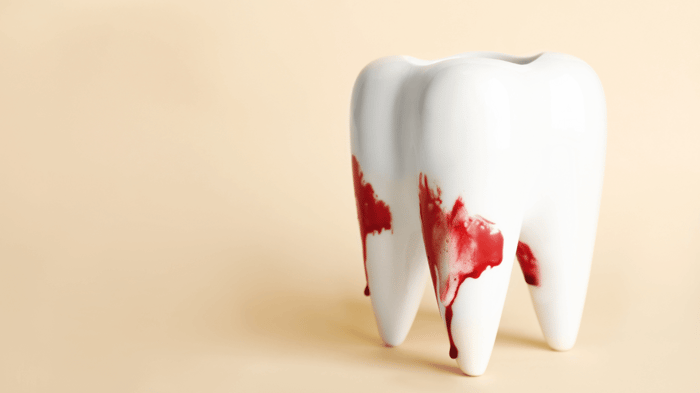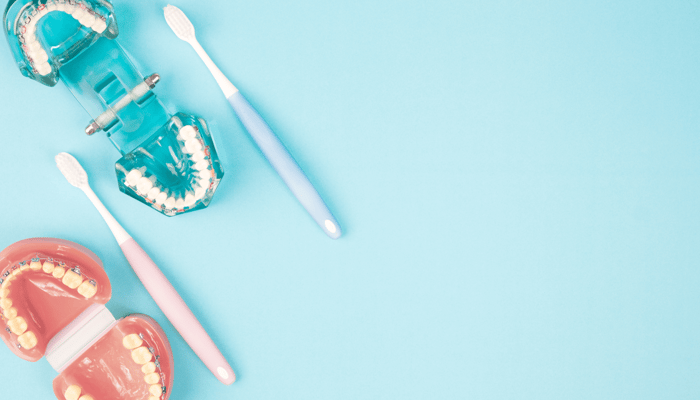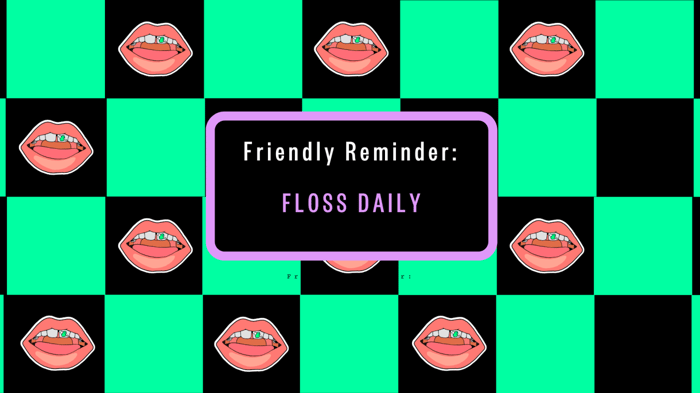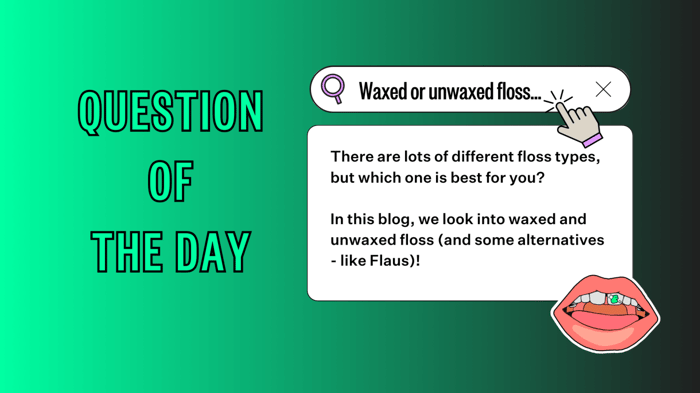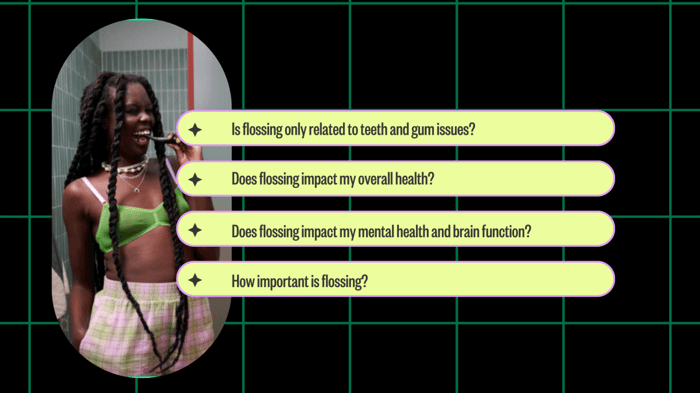Bleeding gums when flossing sounds gross, right? Well, don't panic. Although it’s always advised to contact a dentist when you notice your gums bleeding when glossing:, it can be relatively common for gums to bleed if you're a newbie flosser – as long as the bleeding stops quickly. However, bleeding gums can also be a sign of other issues at play, like gum disease.😣
We know that flossing daily helps prevent gum disease (and so much more), so, when it comes to perfecting the art of daily oral hygiene, the world-first electric flosser, Flaus, is revolutionizing oral care as the fastest, easiest and the ‘least gross’ flossing experience in town. Recommended by dentists, Flaus is your new flossing BFF for maintaining optimum oral health.
Get ready to dive beneath the gumline. You'll be a DTF (Down To Flaus) in no time.
Bleeding Gums: What Are the Common Causes When Flossing?
Bleeding gums can happen for many reasons - some that are serious and some that are relatively common and not cause for concern. Two common causes are:
1. Gum Irritation
2. Gum Disease
Gum Irritation
Sometimes, bleeding gums can be a sign of simple irritation from when you floss. Rough, over-enthusiastic flossing or intermittently flossing can cause your gums to bleed.
If you’re an infrequent flosser (flossing right before your dentist appointment or only when you feel something caught in your teeth) - bleeding gums might be a sign you need to start flossing more! One of the benefits of Flaus is that we do the hard work for you! You don’t need to add vigorous pressure (which can also cause bleeding), just let the vibrations lead the way!
Gum Disease or Plaque
Gums bleeding when flossing can also be a sign of gum disease. For all of our zero flossers (don’t worry - you’re not alone - over 32% of Americans admit to never flossing): not flossing can breed plaque and tartar buildup along and below the gum line, which, if you ignore it – can lead to (you can guess where we're going with this …) the nemesis of all dentists: gum disease.
Gum disease is most commonly caused by the buildup of plaque and tartar, around or below your gumline. Plaque and tartar cause bacterial growth and make your gums more susceptible to bleeding.
If your gums are bleeding, and you’re not seeing relief, it might be time to see your dentist. If your gums are inflamed, you may have gingivitis or a more severe form of gum disease known as periodontitis. Plaque, as well as tartar buildup, are direct causes of gingivitis and form when you don't have proper daily brushing and flossing habits.
Why Is Flossing Daily So Important?
We won’t lie - we're flossing fanatics, but it wasn’t always that way! A lot of us on Team Flaus are reformed bad flossers who lied to our dentists. But these facts helped to turn us around 😁:
- Did you know that only 60% of your teeth surfaces are cleaned when you brush – and flossing helps cleaning the remaining 40%!
- The benefits of daily flossing are a-plenty:
- Great looking smile ✅
- Fresh breath ✅
- Protects your health (oral, mental + physical) ✅
- Fights against gum disease ✅
- Removes plaque ✅
- Reduces tartar buildup ✅
- Reduces expensive dentistry work ✅
Bleeding Gums: When to Seek a Dentist?
We like to be cautious - so,if you are unsure whether to go to the dentist or not, we would always suggest seeking a professional opinion. That way, you can ensure that you have ruled out worse consequences and chronic diseases, such as gingivitis.
If you notice your gums bleeding when flossing, and they are red, swollen, and irritated, feel tender and painful, or you can't get the bleeding to stop, please don't ignore it and seek medical attention.
Periodontists have three extra years of training in preventing, diagnosing, and treating gum issues – like stopping bleeding gums. Unfortunately, most people who have periodontal disease either haven't been diagnosed or are not actively seeking treatment. The result? It's grim: tooth loss, severe decay and root canal issues. So, there's no excuse: don't delay.
Top Tips for Bleeding Gums When Flossing
Apply a cold compress when you notice your swollen or bleeding gums after flossing. The cold helps to reduce swelling, restrict blood flow, help with clotting, and ultimately help your gums stop bleeding. Hold the ice pack there for about 20 minutes at a time.
A warm salt rinse does wonders too. The most common reason for bleeding gums when flossing is bacteria and plaque buildup - swishing warm salt water around your mouth can help stop the bleeding. Saltwater can help reduce bacteria, cause natural healing, and help prevent bleeding gums. Add a little salt to warm water and swish it in your mouth for a few seconds before spitting it into the sink. You can repeat several times a day to speed up the healing process.
Other Potential Causes of Bleeding Gums
We all know that nutrition plays a big part in your overall health - but did you know that it also plays a large part in our oral health? A vitamin C deficiency can contribute to bleeding gums.
To optimize your oral health, opt for crunchy fruits and veggies, leafy greens, and anti-inflammatory foods. This helps scrape plaque off of your teeth while also increasing your vitamin K and vitamin C intake. Vitamin K helps your blood clot, and vitamin C helps fight off infections in your mouth. So, get munching.
Eat less sugar: everybody knows that excessive sugar can be bad for you – but did you know that sugar and plaque are best friends. Where there's sugar, there's the potential for plaque buildup and the growth of bacteria. The easiest way to combat this is to consume less sugar. The American Heart Association suggests eating just 36g for men and 25g for women daily. However, if you’re going to have a sweet treat (we can’t resist all of the time!), we would suggest flossing and brushing after eating!
Replacing those unhealthy habits with healthy ones will help improve your overall health, as well as your oral health!
Conclusion
Flossing is a vital part of oral hygiene routine. Sometimes, you may notice bleeding from your gums when you floss.
Bleeding gums can also be a sign of poor oral hygiene. Be sure to brush your teeth at least twice daily and floss once daily. Otherwise, plaque buildup along your gums causes inflammation and makes it easy for them to bleed when flossing.
Our innovative electric flosser, Flaus, is designed to be the ultimate flossing companion - quickly removing stubborn plaque and debris where your brush can't reach with 10,000 sonic vibrations per minute. That means you can effortlessly and efficiently floss in under 1-minute without a mouth full of fingers (and germs)!
Even if your teeth and gums seem healthy and free of disease and decay – remember to go to your routine check-ups. At Flaus, we believe preventive care plays a huge role in your oral health, so it's important to stay consistent by living our mantra, 'Floss daily! '










